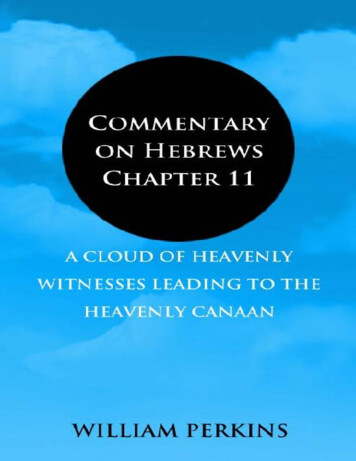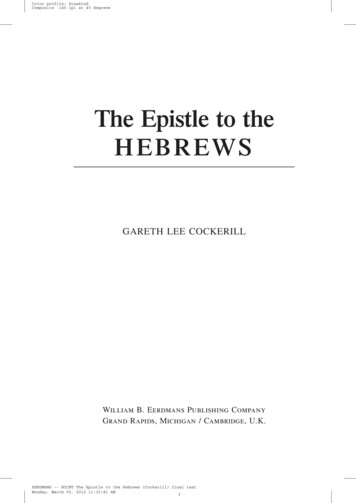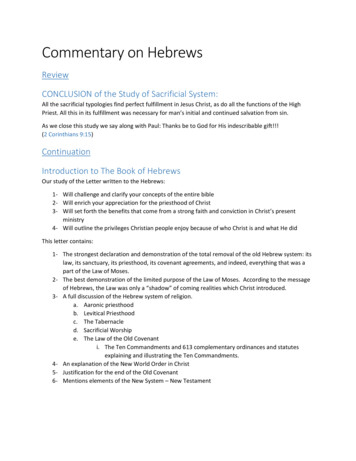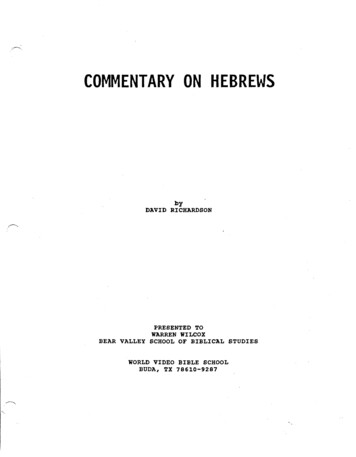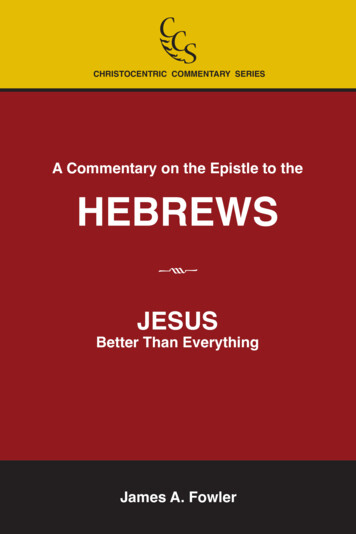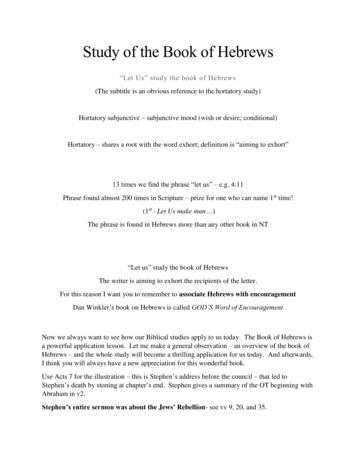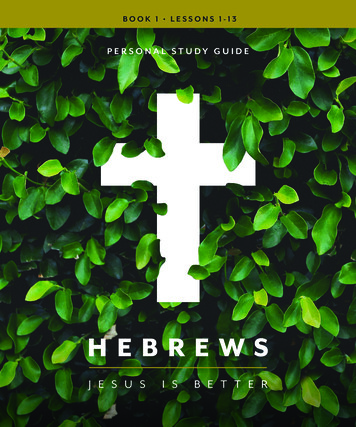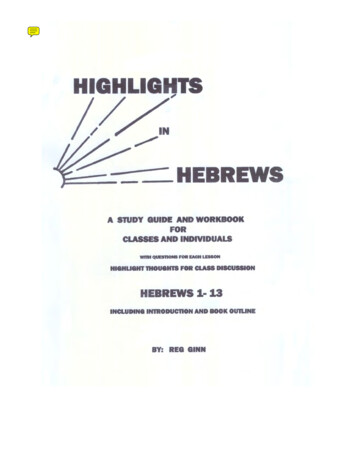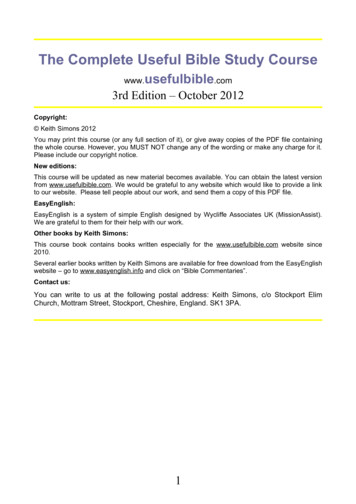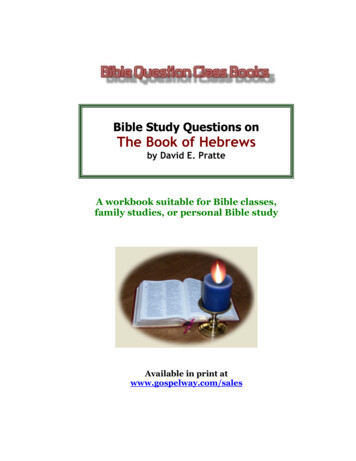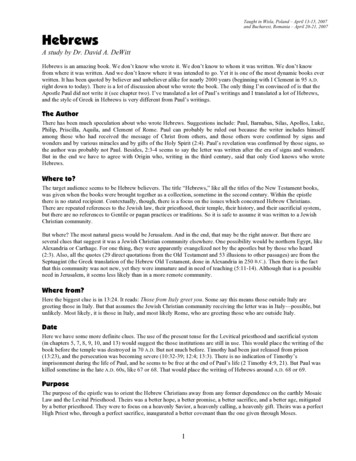
Transcription
A CommentaryonHebrewsBy Will Smee,January 21, 20221
INTRODUCTION3Preparation3AN OUTLINE6HEBREWS CHAPTER 119HEBREWS CHAPTER 221HEBREWS CHAPTER 323HEBREWS CHAPTER 426HEBREWS CHAPTER 528HEBREWS CHAPTER 633HEBREWS CHAPTER 748HEBREWS CHAPTER 852HEBREWS CHAPTER 954HEBREWS CHAPTER 1058HEBREWS CHAPTER 1162HEBREWS CHAPTER 1272HEBREWS CHAPTER 1377IN CONCLUSION822
IntroductionWithout going into all of the different theories about the book of Hebrews, we will restrict ourselves tothe text, and its context in the word of God. Our motto will be, “When the literal sense makes sense, seek noother sense, for any other sense is nonsense.”As to who wrote the book of Hebrews, we have no definitive evidence. But there is some evidence thatit was Paul as we read in the closing lines of the epistle in Hebrews 13 (KJV):19 But I beseech you the ratherto do this, that I may be restored to you the sooner. 20 Now the God of peace, that brought again from the deadour Lord Jesus, that great shepherd of the sheep, through the blood of the everlasting covenant, 21 Make youperfect in every good work to do his will, working in you that which is well pleasing in his sight, through JesusChrist; to whom be glory for ever and ever. Amen. 22 And I beseech you, brethren, suffer the word ofexhortation: for I have written a letter unto you in few words. 23 Know ye that our brother Timothy is set atliberty; with whom, if he come shortly, I will see you. 24 Salute all them that have the rule over you, and all thesaints. They of Italy salute you. 25 Grace be with you all. Amen.The writer wanted to be “restored” to them the sooner. This tells us that he had been face to face withthem at one time. It is possible that the writer was in prison. In the generally accepted Greek translation we readin Hebrews 10 (NASB):34 For you showed sympathy to the prisoners and accepted joyfully the seizure of yourproperty, knowing that you have for yourselves a better possession and a lasting one.For the author to have known this about those he was writing to, that is, that they had “showed sympathyto the prisoners and accepted joyfully the seizure of your property”, could only mean that he had first handknowledge of such behavior. We know that Paul had spent time in prison.Then, the writer of Hebrews mentions Timothy, with whom he often ministered with, as is mentioned inthe book of Acts, and in several epistles. And, the writer is apparently in Italy.Finally, the level of knowledge in this epistle seems to reflect Paul’s hand. There is just no one elseknown to us to have the knowledge that this writer has who could have written Hebrews. If it was Paul whowrote Hebrews, it was probably written in the late 60’s A.D., and of course before 70 A.D.The fact that Paul was a Jew also lends support to his having written this book.PreparationWe must understand why the book is called Hebrews. Now we read of “the fathers” in the followingverses:Hebrews 1 (KJV):1 God, who at sundry times and in divers manners spake in time past unto the fathers by theprophets, 2 Hath in these last days spoken unto us by his Son, whom he hath appointed heir of all things, bywhom also he made the worlds;Hebrews 3 (KJV):7 Wherefore (as the Holy Ghost saith, Today if ye will hear his voice, 8 Harden not yourhearts, as in the provocation, in the day of temptation in the wilderness: 9 When your fathers tempted me,proved me, and saw my works forty years.This book is written to Jews who have become Christians, as we shall see. The writer will use manyhypothetical cases in which he will draw from the history of the Jews in the Old Testament, to shape these Jewswho had become Christians.Now, to help us understand the Jewish mind, we will read Isaiah 58 (KJV):1 Cry aloud, spare not, liftup thy voice like a trumpet, and shew my people their transgression, and the house of Jacob their sins. 2 Yetthey seek me daily, and delight to know my ways, as a nation that did righteousness, and forsook not theordinance of their God: they ask of me the ordinances of justice; they take delight in approaching to God.3 Wherefore have we fasted, say they, and thou seest not? Wherefore have we afflicted our soul, and thou takest3
no knowledge? Behold, in the day of your fast ye find pleasure, and exact all your labours. 4 Behold, ye fast forstrife and debate, and to smite with the fist of wickedness: ye shall not fast as ye do this day, to make your voiceto be heard on high. 5 Is it such a fast that I have chosen? A day for a man to afflict his soul? Is it to bow downhis head as a bulrush, and to spread sackcloth and ashes under him? Wilt thou call this a fast, and an acceptableday to the LORD?To the Jews, serving the Lord was about ritual. But the Lord is not about ritual as we continue inIsaiah 58 (KJV):6 Is not this the fast that I have chosen? To loose the bands of wickedness, to undo the heavyburdens, and to let the oppressed go free, and that ye break every yoke? 7 Is it not to deal thy bread to thehungry, and that thou bring the poor that are cast out to thy house? When thou seest the naked, that thou coverhim; and that thou hide not thyself from thine own flesh? 8 Then shall thy light break forth as the morning, andthine health shall spring forth speedily: and thy righteousness shall go before thee; the glory of the LORD shallbe thy reward. 9 Then shalt thou call, and the LORD shall answer; thou shalt cry, and he shall say, Here I am. Ifthou take away from the midst of thee the yoke, the putting forth of the finger, and speaking vanity; 10 And ifthou draw out thy soul to the hungry, and satisfy the afflicted soul; then shall thy light rise in obscurity, and thydarkness be as the noon day: 11 And the LORD shall guide thee continually, and satisfy thy soul in drought, andmake fat thy bones: and thou shalt be like a watered garden, and like a spring of water, whose waters fail not.12 And they that shall be of thee shall build the old waste places: thou shalt raise up the foundations of manygenerations; and thou shalt be called, The repairer of the breach, The restorer of paths to dwell in.Serving the Lord is about relationship, and not just about relationship with our fellow man and woman,but about relationship with the Lord as we continue in Isaiah 58 (KJV):13 If thou turn away thy foot from thesabbath, from doing thy pleasure on my holy day; and call the sabbath a delight, the holy of the LORD,honourable; and shalt honour him, not doing thine own ways, nor finding thine own pleasure, nor speaking thineown words: 14 Then shalt thou delight thyself in the LORD; and I will cause thee to ride upon the high places ofthe earth, and feed thee with the heritage of Jacob thy father: for the mouth of the LORD hath spoken it.Israel was stuck in just performing the ritual. They bowed down their head as a bulrush, and spreadsackcloth and ashes under themselves, but they did not loose the bands of wickedness, or undo the heavyburdens, and let the oppressed go free. They did not break every yoke, or deal their bread to the hungry, or bringthe poor that are cast out to their house. Their religion was about ritual, and even during the ritual, they foundpleasure, and exacted all their labours, that is, they drove hard all their workers, and fasted for strife and debate,and smote with the fist of wickedness.Their hearts were not in it. But this is what the Lord wants, our hearts, as we read in Isaiah 29 (KJV):9Stay yourselves, and wonder; cry ye out, and cry: they are drunken, but not with wine; they stagger, but not withstrong drink. 10 For the LORD hath poured out upon you the spirit of deep sleep, and hath closed your eyes: theprophets and your rulers, the seers hath he covered. 11 And the vision of all is become unto you as the words ofa book that is sealed, which men deliver to one that is learned, saying, Read this, I pray thee: and he saith, Icannot; for it is sealed: 12 And the book is delivered to him that is not learned, saying, Read this, I pray thee:and he saith, I am not learned. 13 Wherefore the Lord said, Forasmuch as this people draw near me with theirmouth, and with their lips do honour me, but have removed their heart far from me, and their fear toward me istaught by the precept of men: 14 Therefore, behold, I will proceed to do a marvellous work among this people,even a marvellous work and a wonder: for the wisdom of their wise men shall perish, and the understanding oftheir prudent men shall be hid.This was the state of the nation when the Lord uprooted Israel in the north in 723 B.C., and Judah in thesouth in 586 B.C. When Jesus came as a root out of dry ground, after the Lord had brought them back to theland, as a nation they were still stuck in their ritual. And so they crucified their Messiah, but a remnant werespared.Let us remember that we are no different than they. The book of Hebrews speaks to Gentiles just asmuch as to Jews. It is the word of God.Now it is good to remember that the Jews, to whom the book of Hebrews is speaking to, are brethren aswe read in Hebrews 3 (KJV):1 Wherefore, holy brethren, partakers of the heavenly calling, consider theApostle and High Priest of our profession, Christ Jesus;4
And in Hebrews 3 (KJV):12 Take heed, brethren, lest there be in any of you an evil heart of unbelief, indeparting from the living God.And in Hebrews 10 (KJV):19 Having therefore, brethren, boldness to enter into the holiest by the bloodof Jesus And in Hebrews 13 (KJV):22 And I beseech you, brethren, suffer the word of exhortation: for I havewritten a letter unto you in few words.And they are addressed as “beloved” in Hebrews 6 (KJV):9 But, beloved, we are persuaded betterthings of you, and things that accompany salvation, though we thus speak.This is not to say that there could not have been someone who was still unsaved in unbelief as inHebrews 3:12 above. But the book of Hebrews is addressed to believing Jews.5
An OutlineI. God’s Son1. God spoke by the prophets in time past; Hebrews 1:12. God has now spoken to us by His Son; Hebrews 1:2a. whom he hath appointed heir of all things,b. by whom also he made the worlds;c. who is the brightness of his glory; Hebrews 1:3d. and the express image of his person;e. and upholding all things by the word of his power;f. who by himself purged our sins;g. and has sat down on the right hand of the Majesty on high;3. God’s Son is better than the angelsa. he has by inheritance obtained a more excellent name than they; Hebrews1:4b. God never spoke to the angels, Thou art my Son, this day have I begotten thee.And again, I will be to him a Father, and he shall be to me a Son; Hebrews 1:5c. And again, when he bringeth in the firstbegotten into the world, he saith, And let all theangels of God worship him. Hebrews 1:6d. And of the angels he saith, Who maketh his angels spirits, and his ministers a flame offire. And to the Son he says, Thy throne, O God, is for ever and ever: a scepter ofrighteousness is the scepter of thy kingdom; Hebrews 1:7-8e. And, Thou hast loved righteousness, and hated iniquity; therefore God, even thy God,hath anointed thee with the oil of gladness above thy fellows; Hebrews 1:9f. The Lord, in the beginning hast laid the foundation of the earth; and the heavens are theworks of His hands, and they shall be changed, but He is the same, and His years shallnot fail; Hebrews 1:10-12g. God never spoke to the angels, “Sit on my right hand, until I make thine enemiesthy footstool” Hebrews 1:13h. angels are only ministering spirits, sent forth to minister for them who shall be heirs ofsalvation; Hebrews 1:144. God’s Son is our Kinsmen Redeemera. The Lord has spoken about a great salvation to which we must give earnest heedHebrews 2:1-2b. This great salvation has been confirmed by them that heard Him, and God has bornwitness both with signs and wonders, and with divers miracles, and gifts of the HolyGhost, according to his own will; Hebrews 2:3-4c. God has set man over the works of His hands;i. For unto the angels hath he not put in subjection the world to come, whereofwe speak. But one in a certain place testified, saying, What is man, that thou artmindful of him? or the son of man that thou visitest him? Hebrews 2:5-6ii. Thou madest him a little lower than the angels; thou crownedst him with gloryand honour, and didst set him over the works of thy hands: Hebrews 2:7iii. Thou hast put all things in subjection under his feet. For in that he put all insubjection under him, he left nothing that is not put under him. But now we seenot yet all things put under him. Hebrews 2:8d. Jesus is the captain of our salvation;i. He was made a little lower than the angels for the suffering of death,crowned with glory and honour; that he by the grace of God shouldtaste death for every man; Hebrews 2:96
ii. For it became him, for whom are all things, and by whom are all things,in bringing many sons unto glory, to make the captain of theirsalvation perfect through sufferings; Hebrews 2:10iii. For both he that sanctifieth and they who are sanctified are all of one:for which cause he is not ashamed to call them brethren, Saying, I will declarethy name unto my brethren, in the midst of the church will I sing praiseunto thee. And again, I will put my trust in him. And again, Behold I and thechildren which God hath given me. Hebrews 2:11-13iv. Forasmuch then as the children are partakers of flesh and blood, healso himself likewise took part of the same; that through death hemight destroy him that had the power of death, that is, the devil; Anddeliver them who through fear of death were all their lifetime subject tobondage; Hebrews 2:14-15v. He took not on him the nature of angels; but he took on him the seedof Abraham; Hebrews 2:16vi. in all things it behooved him to be made like unto his brethren, that hemight be a merciful and faithful high priest in things pertaining to God,to make reconciliation for the sins of the people; Hebrews 2:17vii. in that he himself hath suffered being tempted, he is able to succourthem that are tempted; Hebrews 2:18vii. He is the Apostle and High Priest of our profession, Christ Jesus;Hebrews 3:15. He is better than Mosesa. He was faithful to him that appointed him, as also Moses was faithful in all his house;Hebrews 3:2b. He was counted worthy of more glory than Moses, inasmuch as he who hath buildedthe house hath more honour than the house; Hebrews 3:3-4c. Moses verily was faithful in all his house, as a servant, for a testimony of those thingswhich were to be spoken after; But Christ as a son over his own house; whose houseare we, if we hold fast the confidence and the rejoicing of the hope firm unto the end.Hebrews 3:5-6d. a warning if you will hear His voice;i. Wherefore (as the Holy Ghost saith, To day if ye will hear his voice,Harden not your hearts, as in the provocation, in the day of temptation in thewilderness: When your fathers tempted me, proved me, and saw my worksforty years. Wherefore I was grieved with that generation, and said, They doalways err in their heart; and they have not known my ways. So I sware in mywrath, They shall not enter into my rest.) Hebrews 3:7-11ii. Take heed, brethren, lest there be in any of you an evil heart of unbelief, indeparting from the living God; Hebrews 3:12iii. But exhort one another daily, while it is called Today; lest any of you behardened through the deceitfulness of sin. For we are made partakers of Christ,if we hold the beginning of our confidence steadfast unto the end; Hebrews3:13-14e. Some could not enter in because of sin and unbeliefi. While it is said, Today if ye will hear his voice, harden not your hearts, as inthe provocation. For some, when they had heard, did provoke: howbeit not allthat came out of Egypt by Moses. But with whom was he grieved forty years?Was it not with them that had sinned, whose carcases fell in the wilderness?Hebrews 3:15-177
ii. And to whom sware he that they should not enter into his rest, but to them thatbelieved not? Hebrews 3:18iii. So we see that they could not enter in because of unbelief; Hebrews 3:19II. God’s Rest1. A warning to all, “Let us therefore fear, lest, a promise being left us of entering into his rest,any of you should seem to come short of it”. Hebrews 4:12. The Gospel must be received with faith for it to profit the hearer. Hebrews 4:23. When we believe we enter into rest. Hebrews 4:3a. unbelief keeps us from entering into God’s rest; Hebrews 4:4-7b. Joshua did not give them rest; Hebrews 4:8c. We must labor to enter the rest of the inheritance; Hebrews 4:8-114. The way to God’s rest is found in the word of God; Hebrews 4:12a. all things are open unto the eyes of him with whom we have to do; Hebrews 4:135. We have a great high priest, that is passed into the heavens, Jesus the Son of God; Hebrews4:14a. He can be “touched with the feeling of our infirmities”, for He “was in all pointstempted like as we are, yet without sin”; Hebrews 4:15b. Therefore, we can “come boldly unto the throne of grace, that we may obtain mercy,and find grace to help in time of need”; Hebrews 4:16c. Men’s high priesti. is ordained for men in things pertaining to God, that he may offer both giftsand sacrifices for sins: Hebrews 5:1ii. can have compassion on the ignorant, and on them that are out of the way; forthat he himself also is compassed with infirmity; Hebrews 5:2iii. by reason hereof he ought, as for the people, so also for himself, to offer forsins; Hebrews 5:3iv. no man taketh this honour unto himself, but he that is called of God, as wasAaron; Hebrews 5:4d. God’s high priesti. Christ glorified not himself to be made an high priest; but he that said untohim, Thou art my Son, to day have I begotten thee; Hebrews 5:5ii. As he saith also in another place, Thou art a priest for ever after the order ofMelchisedec; Hebrews 5:6iii. He was a Son, “yet learned he obedience by the things which he suffered”;Hebrews 5:7iv. being made perfect, he became the author of eternal salvation unto all themthat obey him; Hebrews 5:8-9v. Called of God an high priest after the order of Melchisedec; Hebrews 5:106. The Hebrews were dull of hearing; Hebrews 5:11a. for the time they ought to be teachers; Hebrews 5:12b. they have need that one teach them again which be the first principles of the oracles ofGod; Hebrews 5:12c. they have become such as have need of milk, and not of strong meat; Hebrews 5:12d. using milk, they were babes, being unskillful in the word of righteousness; Hebrews5:13e. strong meat belongeth to them that are of full age, even those who by reason of usehave their senses exercised to discern both good and evil; Hebrews 5:14III. Pressing Onward1. leaving the first principles of the doctrine of Christ; Hebrews 6:1a. let us go on unto perfection, not laying again the foundation; Hebrews 6:1-28
i. of repentance from dead worksii. and of faith toward Godiii. of the doctrine of baptismsiv. and of laying on of handsv. and of resurrection of the deadvi. and of eternal judgmentb. And this will we do, if God permit; Hebrews 6:32. A solemn warning to those who would fall awaya. it is impossible for those whoi. were once enlightened; Hebrews 6:4ii. and have tasted of the heavenly gift;iii. and were made partakers of the Holy Ghost;iv. And have tasted the good word of God, and the powers of the world to come;Hebrews 6:5b. If they shall fall away, to renew them again unto repentance; seeing they crucify tothemselves the Son of God afresh, and put him to an open shame; Hebrews 6:6i. For the earth which drinketh in the rain that cometh oft upon it, and bringethforth herbs meet for them by whom it is dressed, receiveth blessing from God;Hebrews 6:7ii. But that which beareth thorns and briers is rejected, and is nigh unto cursing;whose end is to be burned; Hebrews 6:83. An encouragement to the beloveda. But, beloved, we are persuaded better things of you, and things that accompanysalvation, though we thus speak; Hebrews 6:9i. For God is not unrighteous to forget your work and labour of love, which yehave shewed toward his name, in that ye have ministered to the saints, and dominister; Hebrews 6:10b. And we desire that every one of you do shew the same diligence to the full assuranceof hope unto the end: Hebrews 6:11c. That ye be not slothful, but followers of them who through faith and patience inheritthe promises; Hebrews 6:12d. be patient and endure to obtain the promise as Abraham;i. when God made promise to Abraham, because he could swear by no greater, hesware by himself Saying, Surely blessing I will bless thee, and multiplying Iwill multiply thee; Hebrews 6:13-14ii. after he had patiently endured, he obtained the promise; Hebrews 6:15iii. men verily swear by the greater: and an oath for confirmation is to them anend of all strife; Hebrews 6:16iv. but God confirmed His promise to Abraham by an oath in order that “by twoimmutable things, in which it was impossible for God to lie, we might have astrong consolation, who have fled for refuge to lay hold upon the hope setbefore us” Hebrews 6:17-18v. this “hope we have as an anchor of the soul, both sure and steadfast, and whichentereth into that within the veil Whither the forerunner is for us entered, evenJesus, made an high priest for ever after the order of Melchisedec;” Hebrews6:19-20IV. Melchisedek1. was king of Salem, priest of the most high God; Hebrews 7:12. and he blessed Abraham3. to whom Abraham gave a tenth of all after returning from the slaughter of thekings; Hebrews 7:29
4. Without father, without mother, without descent, having neither beginning of days,nor end of life; but made like unto the Son of God; Hebrews 7:35. he abideth a priest continually;6. how great Melchisedek isa. Abraham gave him a tenth of the spoils; Hebrews 7:4b. the sons of Levi get a tenth from their brethren, though they come out of theloins of Abraham; Hebrews 7:5c. But Melchisedek “whose descent is not counted from them received tithes ofAbraham, and blessed him that had the promises”; Hebrews 7:6-7d. there is no record of his death, but “it is witnessed that he liveth”; Hebrews7:8e. so “Levi also, who receiveth tithes, paid tithes in Abraham. For he was yet in theloins of his father, when Melchisedec met him”; Hebrews 7:9-107. why should another priest rise after the order of Melchisedec, and not be called after the orderof Aaron? Hebrews 7:11a. perfection was not “by the Levitical priesthood”, even though “under it the peoplereceived the law”b. since another priest has risen after the order of Melchisedec, and not after the order ofAaron, the priesthood has been changed; Hebrews 7:12i. thus “there is made of necessity a change also of the law”ii. Jesus, our great high priest, was from “another tribe, of which no man gaveattendance at the altar”; Hebrews 7:13iii. our Lord sprang out of Judah; of which tribe Moses spake nothing concerningpriesthood; Hebrews 7:14iv. Jesus has arisen a priest “after the similitude of Melchisedec”, who “is made,not after the law of a carnal commandment, but after the power of an endlesslife”; Hebrews 7:15-16v. for David testified in Psalm 110:4, “Thou art a priest forever after the order ofMelchisedec”; Hebrews 7:17c. There is verily a disannulling of the commandment going before for the weakness andunprofitableness thereof. For the law made nothing perfect, but the bringing in of abetter hope did; by the which we draw nigh unto God; Hebrews 7:18-19d. the sons of Aaron were not made priests with an oath, but Jesus was made a priest withan oath; Hebrews 7:20-21e. By so much was Jesus made a surety of a better testament; Hebrews 7:22f. the sons of Aaron could not “continue by reason of death”; Hebrews 7:23g. Jesus “because he continueth ever, hath an unchangeable priesthood;” Hebrews 7:24h. in this way He is “able also to save them to the uttermost that come unto God by him,seeing he ever liveth to make intercession for them”; Hebrews 7:25i. he fits our need becausei. he “is holy, harmless, undefiled, separate from sinners, and made higher thanthe heavens;” Hebrews 7:26ii. he doesn’t need “daily, as those high priests, to offer up sacrifice, first for hisown sins, and then for the people's: for this he did once, when he offered uphimself”; Hebrews 7:27iii. the law maketh men high priests which have infirmity; but the word of theoath, which was since the law, maketh the Son, who is consecrated forevermore; Hebrews 7:28V. Summary of what has been said1. Now of the things which we have spoken this is the sum: We have such an high priest, whois set on the right hand of the throne of the Majesty in the heavens; A minister of the10
sanctuary, and of the true tabernacle, which the Lord pitched, and not man; Hebrews8:1-22. every high priest is ordained to offer gifts and sacrifices: wherefore it is of necessity that thisman have somewhat also to offer; Hebrews 8:33. if he were on earth, he should not be a priest, seeing that there are priests that offer giftsaccording to the law: Who serve unto the example and shadow of heavenly things, as Moseswas admonished of God when he was about to make the tabernacle: for, See, saith he, thatthou make all things according to the pattern shewed to thee in the mount; Hebrews 8:4-54. now hath he obtained a more excellent ministry, by how much also he is the mediator of abetter covenant, which was established upon better promises; Hebrews 8:65. For if that first covenant was not faultless, a second was needed, that is, the new covenant;Hebrews 8:7i. For finding fault with them, he saith, Behold, the days come, saith the Lord, when Iwill make a new covenant with the house of Israel and with the house of Judah: Notaccording to the covenant that I made with their fathers in the day when I took themby the hand to lead them out of the land of Egypt; because they continued not in mycovenant, and I regarded them not, saith the Lord. Hebrews 8:8-9ii. For this is the covenant that I will make with the house of Israel after those days, saiththe Lord; I will put my laws into their mind, and write them in their hearts: and I willbe to them a God, and they shall be to me a people:iii. For I will be merciful to their unrighteousness, and their sins and their iniquities will Iremember no more.6. In that he saith, A new covenant, he hath made the first old. Now that which decayeth andwaxeth old is ready to vanish away; Hebrews 8:13VI. The Old Covenant was a shadow of heavenly things (Hebrews 8:5)1. the first covenant had also ordinances of divine service, and a worldly sanctuary; Hebrews 9:12. there was a tabernacle made; the first, wherein was the candlestick, and the table, and theshewbread; which is called the sanctuary; Hebrews 9:23. And after the second veil, the tabernacle which is called the Holiest of all; Which had thegolden censer, and the ark of the covenant overlaid round about with gold, wherein was thegolden pot that had manna, and Aaron's rod that budded, and the tables of the covenant; Andover it the cherubims of glory shadowing the mercyseat; of which we cannot now speakparticularly; Hebrews 9:3-54. when these things were thus ordained, the priests went always into the first tabernacle,accomplishing the service of God; Hebrews 9:65. into the second went the high priest alone once every year, not without blood, which heoffered for himself, and for the errors of the people; The Holy Ghost this signifying, that theway into the holiest of all was not yet made manifest, while as the first tabernacle was yetstanding; Hebrews 9:7-8a. which was a figure for the time then present, in which were offered both gifts andsacrifices, that could not make him that did the service perfect, as pertaining to theconscience; Which stood only in meats and drinks, and divers washings, and carnalordinances, imposed on them until the time of reformation; Hebrews 9:9-10VII. The New Covenant is about the actual heavenly things1. Christ being come an high priest of good things to come, not “by the blood of goats andcalves, but by his own blood he entered in once into the holy place”, that is, the “greater andmore perfect tabernacle, not made with hands, that is to say, not of this building”; Hebrews9:11-122. the “blood of Christ, who through the eternal Spirit offered himself without spot to God”, isgreater than “the blood of bulls and of goats, and the ashes of an heifer sprinkling theunclean”, which only “sanctifieth to the purifying of the flesh”; Hebrews 9:13-1411
3. His blood will thus “purge your conscience from dead works to serve the living God”;Hebrews 9:144. for this cause he is the mediator of the new testament, that by means of death, for theredemption of the transgressions that were under the first testament, they which are calledmight receive the promise of eternal inheritance; Hebrews 9:15a. For where a testament is, there must also of necessity be the death of the testator;Hebrews 9:16b. For a testament is of force after men are dead: otherwise it is of no strength at all whilethe testator liveth; Hebrews 9:17c. the first testament was not dedicated without blood, “For when Moses had spokenevery precept to all the people according to the law, he took the blood of calves and ofgoats, with water, and scarlet wool, and hyssop, and sprinkled both the book, and allthe people, Saying, This is the blood of the testament which God hath enjoined untoyou. Moreover he sprinkled with blood both the tabernacle, and all the vessels of theministry. And almost all things are by the law purged with blood; and withoutshedding of blood is no remission”; Hebrews 9:18-22d. it was therefore necessary that the patterns of things in the heavens should be purifiedwith these; but the heavenly things themselves with better sacrifices than these.Hebrews 9:23e. For Christ is not entered into the holy places made with hands, which are the figures ofthe true; but into heaven itself, now to appear in the presence of God for us; Hebrews9:24f. He does not “offer himself often, as the high priest en
a commentary on hebrews by will smee, april 30, 2020 . 2 introduction 3 preparation 3 an outline 6 hebrews chapter 1 19 hebrews chapter 2 21 hebrews chapter 3 23 hebrews chapter 4 26 hebrews chapter 5 28 hebrews chapter 6 33 hebrews chapter 7 48 hebrews
